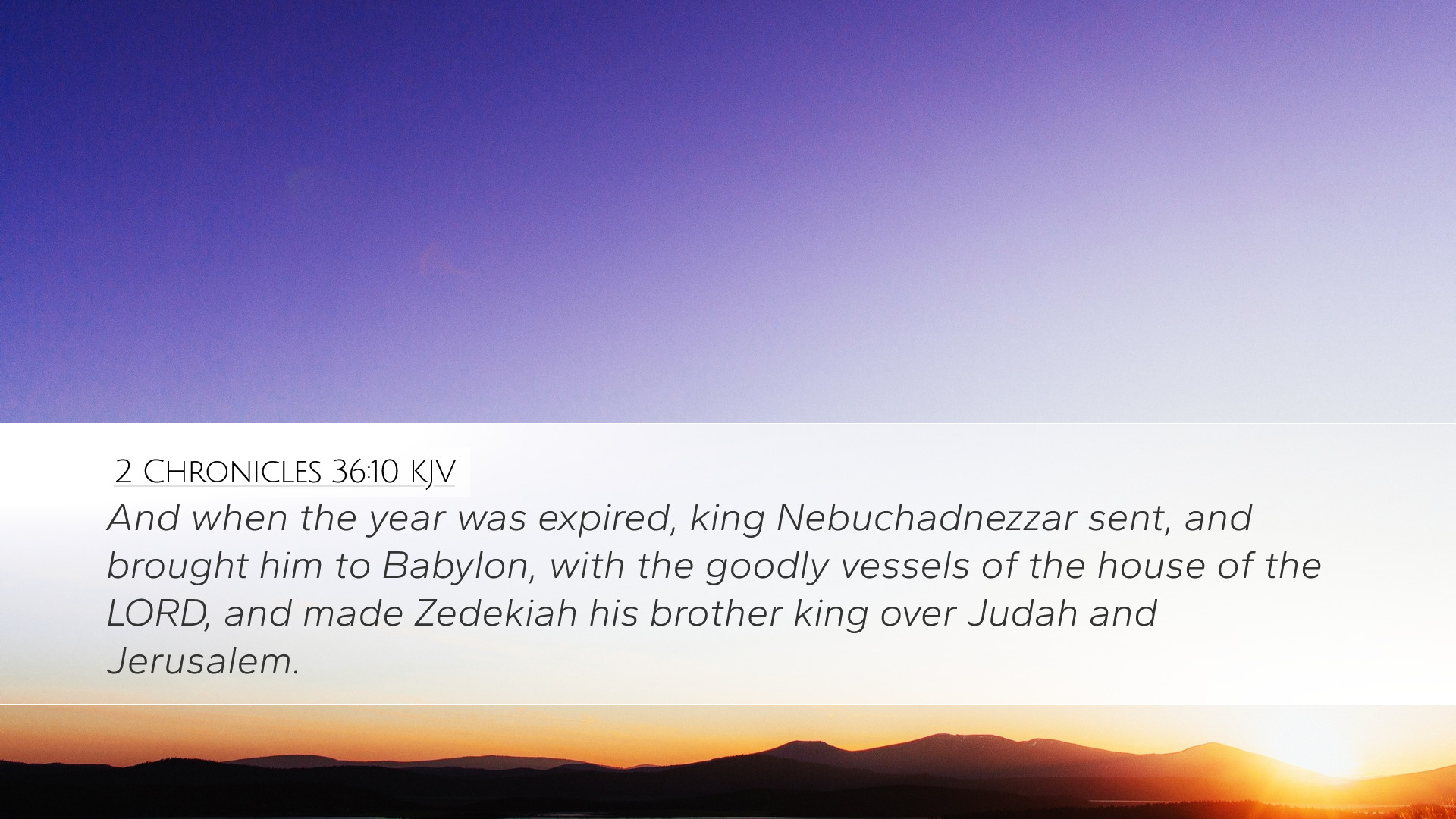Commentary on 2 Chronicles 36:10
Verse Reference: 2 Chronicles 36:10 - "And when the year was expired, king Nebuchadnezzar sent, and brought him to Babylon, with the goodly vessels of the house of the LORD, and made Zedekiah his brother king over Judah."
Introduction
This verse marks a pivotal moment in Judah's history, encapsulating the transition of power and the God's unfolding plan amidst the national turmoil. The selection of Zedekiah as king also signifies a complex relationship between Nebuchadnezzar and the fate of Judah, rooted in both divine sovereignty and human agency. We will explore insights from various public domain commentaries to deepen the understanding of this verse.
Contextual Background
The final chapter of 2 Chronicles encapsulates the historical and spiritual decline of Judah leading up to its Babylonian captivity. Zedekiah's appointment as king underlines the manipulation and pressure by foreign powers during a tumultuous era.
- Matthew Henry: Henry reflects on the futility of the people’s rebellion against God’s appointed authority, noting that Zedekiah, despite being a king, is merely a puppet under Nebuchadnezzar’s control.
- Albert Barnes: Barnes elaborates on the implications of Zedekiah's kingship and how it represents the remnant of God’s judgment on Judah’s disobedience, capturing God’s righteousness in allowing such events.
- Adam Clarke: Clarke points out the significance of bringing the vessels of the house of the LORD to Babylon, symbolizing a transfer of power and the desecration of God's holiness, foreshadowing the eventual destruction of the temple.
Theological Implications
This verse opens avenues for understanding several theological themes relevant to pastors and scholars.
- Divine Sovereignty: The overarching theme here is God's sovereignty over nations and histories. Even when Israel is facing defeat, God's ultimate authority remains intact. Clarke asserts that God appoints rulers, even those who would act contrary to His will, to fulfill His purposes.
- The Nature of Leadership: Zedekiah's leadership, influenced by Babylonian power, speaks to the challenges of authentic leadership under foreign influence. Henry's commentary discusses how leaders must be conscious of their fidelity to God's ways amidst political pressures.
- Consequences of Apostasy: The verse serves as a stark reminder of the consequences that come from turning away from God's commands. Much like Zedekiah, contemporary leaders and nations must consider the resulting chaos from forsaking divine guidance.
Historical Reflection
Historically, Zedekiah's reign is marked by a struggle for independence against Babylonian hegemony, a movement driven by both personal ambition and nationalistic fervor.
- Judah's Political Landscape: Zedekiah, appointed over a vassal state, reflects the tenuous nature of Israel's political autonomy as examined by Barnes. The leadership dynamics reveal the tension between divine providence and human actions.
- Impact of Foreign Domination: Clarke mentions how foreign domination inevitably influenced the worship of Yahweh and led to syncretism within the community. This is an important lesson for contemporary settings regarding the purity of faith amidst external pressures.
Applications for Modern Believers
For pastors and students of scripture, several applications can be drawn from this passage.
- Faithfulness Amidst Adversity: Just as Zedekiah had to navigate the challenges of his position, modern believers are called to remain faithful amidst adversity.
- Understanding God’s Plan: The complexities of human decisions must be viewed through the lens of divine providence. Understanding this can provide comfort and encouragement in uncertain times.
- Duty of Bold Witness: In a world influenced by numerous external factors, believers are reminded of their duty to witness and uphold God’s truth as demonstrated in the lives of those before us.
Conclusion
In 2 Chronicles 36:10, we find a wealth of lessons regarding leadership, divine sovereignty, and the challenges of faithfulness amidst adversity. Zedekiah's brief reign encapsulates the tension between God's sovereignty and human agency, serving as a reminder to contemporary believers of their calling amidst the complexities of life.


